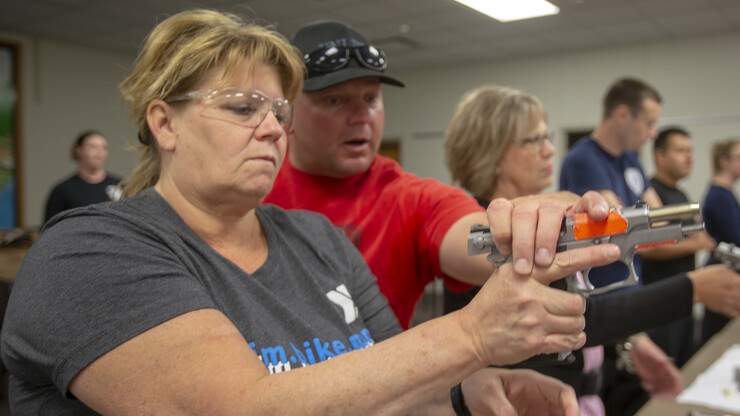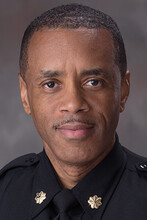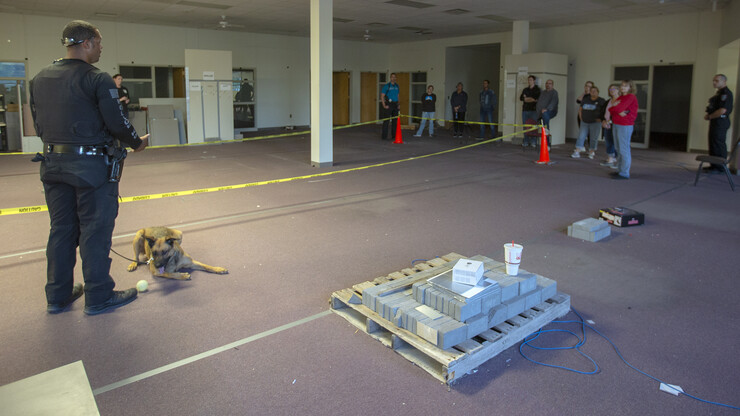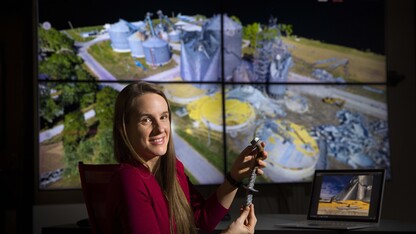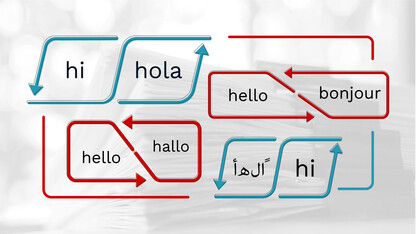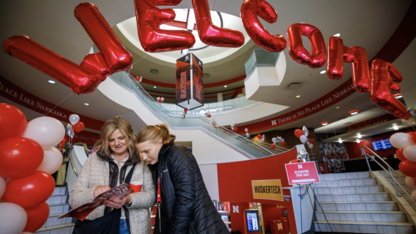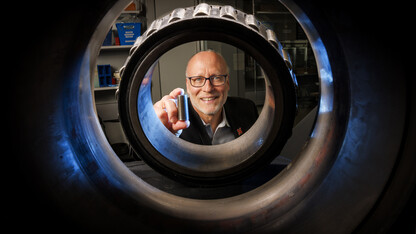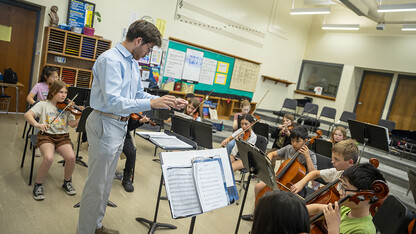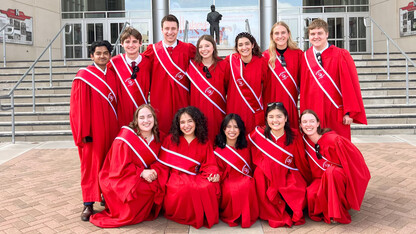· 7 min read
Explosives, handcuffs and pistols — oh my
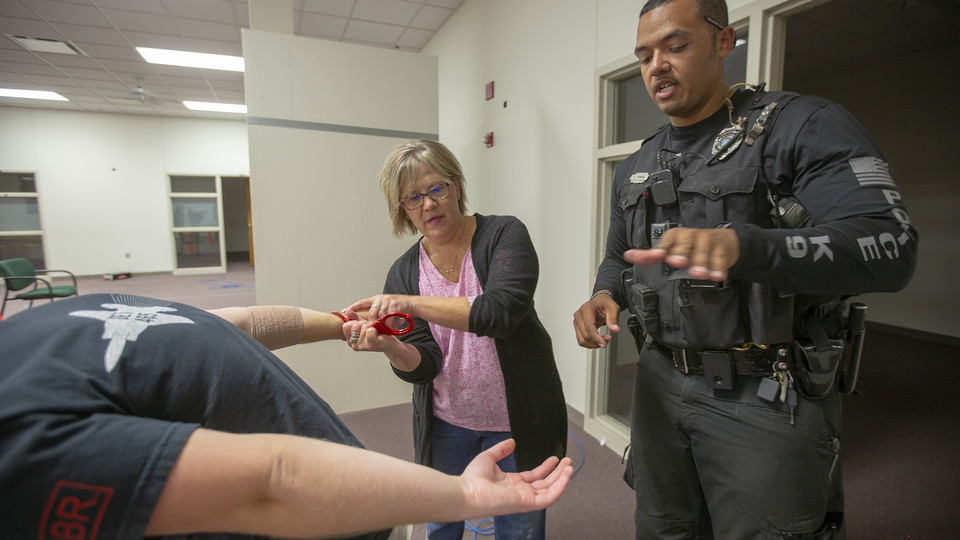
A thunderous disagreement reverberates through a closed door.
“Dispatched” to a domestic disturbance, my partner, Beth Cullinane, steps up to the door and knocks — hard.
Knock. Shouting. Knock. Yelling. Knock. No answer. Just bellows.
“Police, open the door,” shouts Cullinane, a staff employee in the College of Dentistry by day and member of the University Police Departments’ Citizens’ Police Academy on Wednesday nights.
As the cacophony intensifies and sensing the potential for danger, we open the door and stumble into chaos, as the anger of a man and woman — previously directed at each other — funnels directly at us.
Amid the shouts — of which I recall no details, only noise — we inquire about the disagreement and request that one of the two step out of the room. Our hesitation, or maybe indecision, allows the woman to, in the blink of an eye, pull a knife, dash across the room and stab the man with whom she argued.
Cullinane draws her weapon. In the same instant, I move across the room — right into my partner’s line of fire — and grab the woman’s hand to stop the attack while fumbling for handcuffs.
“Real world,” a UPD officer shouts, signaling the safe word that ends the scenario.
Surprising no one, Cullinane and I fail the scenario. It’s week two of the Citizens’ Police Academy and unlike actual police cadets, we’ve had minutes of instruction before being thrown into one of the most dangerous scenarios law enforcement can face.
“This is a good way to give our participants a window into some of the dynamic situations that can occur in law enforcement work,” UPD Assistant Chief Hassan Ramzah said. “No situation we go into is routine. Officers have to take into account every possibility and assess the situation immediately. The one thing we cannot do is second guess our actions.”
Launched this fall by the University Police Department, the Citizens’ Police Academy is a six-week program designed to educate student, faculty and staff volunteers about law enforcement. It includes information about campus public safety and police procedures. The first cohort includes 12 volunteers from across the University of Nebraska–Lincoln.
Becoming a police officer
Back in the real world, the process to become a University of Nebraska–Lincoln police officer takes about a year from the time someone applies to the day they step out alone on patrol.
Before a potential hire makes it into the 15-week academy at the Nebraska Law Enforcement Training Center in Grand Island, they will have navigated a four- to six-month hiring gauntlet of background checks, psychological testing, physical agility requirements and a polygraph test.
“And even if you successfully complete those processes, you still may not be selected for the job,” Ramzah said.
At the academy in Grand Island, trainees learn about the central functions of law enforcement — from legal issues and arrest procedures to how to interact with the public and use of deadly force.
Sarah Murtagh, human resources and public relations coordinator for the department, monitors the progress of trainees while at the academy. If a candidate fails to meet qualifications in a training session, they’re allowed another chance to earn a passing grade. A second fail results in the candidate being removed from the program.
For the record, the vast majority of UPD trainees successfully navigate the academy. Recently, two new university officers — both Nebraska graduates — were named among the best in the state training center’s 199th Basic Class. Those new officers and awards earned include Kathleen Brandt with the Academic Achievement Award for highest grade point average in the class; and Caleb Gose with the Outstanding Student Award.
After completing the academy, new officers are put through an additional three-month field training program. During that time, the recruits spend an average of one month riding with senior police officers on each of the three UPD work shifts.
Brandt and Gose are currently in the field training program.
“Officers take what they learned in the academy and apply it in a more hands-on approach, performing police duties on campus alongside senior officers,” Ramzah said. “This time functions as both a training process for the officer and an evaluation process for the department.”
When a new officer makes a first solo campus patrol, the university has invested about $40,000 in their hire, training and equipment.
A career in training
Learning is never complete for a police officer.
While they continue to develop and hone on-the-job tactics through interactions with the public, each UPD police officer is required to complete 20 hours of training each year.
“Some of that, like weapons proficiency, is required,” Ramzah said. “Other training is specialized and allows the officer to continue to enhance their job knowledge and skills.”
And, many of the campus police are called on to lead training efforts at the academy in Grand Island. For instance, K-9 officers Greg Byelick and Russell Johnson Jr. are also specialists in self-defense training and share their expertise with other officers across Nebraska.
Tossed into the deep end
For the second week of the Citizens’ Police Academy, the UPD tossed the student, faculty and staff participants into the deep end of the law enforcement pool.
After a demonstration on how the department’s bomb-detecting K-9 teams operate, the session included basic instruction using a firearm (blue plastic pistols at first, then Smith and Wesson 5906 pistols loaded with non-lethal training rounds), applying handcuffs and using pressure points to subdue individuals.
The evening concluded with academy participants working as patrol teams through scenarios ranging from an aggressive door answer to an active shooter.
The actors — all members of the UPD — made the scenarios as realistic as possible, helping participants realize some of the real-life pressures and split-second decisions officers face when on duty.
“This was truly a hands-on feel of what law enforcement is,” Ramzah said. “Even with all of our training and experience, there is no routine in our day-to-day work.
“Most of the time, we have good outcomes — sometimes they can be not so good. Depending on what the officer does or how the person in the incident responds, those outcomes can have life-changing effects.”
And, while a handful of the Citizens’ Police Academy scenarios resulted in successful encounters, many ended in failures — almost all due to our lack of training.
